IV. Workshop „Apokalyptik und Prophetie im Mittelalter“
28.-29. 6. 2011
IMAFO, Vienna
The Apocalypse – Functions and Symbolic Representations of a Concept
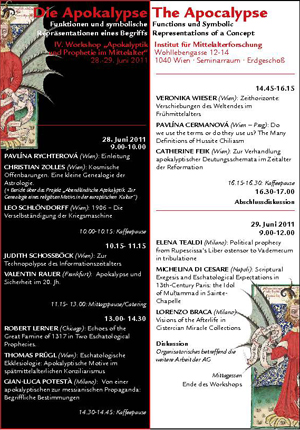 Das 4. Treffen der Arbeitsgruppe „Apokalyptik und Prophetie im Mittelalter“ (2008 in Modena, 2009 in Budapest, 2010 in Prag) will in seinem Anspruch zum ersten Mal die Grenzen des Mittelalters überschreiten (1) in einer breiter angelegten interdisziplinären Diskussion neue Impulse für eigene, mediävistisch definierte Fragen und Probleme gewinnen und (2) einen Schritt den Disziplinen entgegen zu machen, die sich in ihrer Forschung mit Phänomenen beschäftigen, die im Mittelalter (bzw. Mittelalter und Spätantike) theologisch definiert und auch weitgehend differenziert wurden. Die Endzeit-Erwartung, die in der europäischen Kultur bis heute präsent und oft auch prägend ist, stellt einen aufregenden Forschungsgegenstand für viele Zweige der Geistes- Sozial- und Kulturwissenschaften dar. In Wien hat sich im April mit der Ansiedlung des mediävistischen ERC-Projektes „The origins of the vernacular mode“ von P. Rychterová an der ÖAW eine Möglichkeit der Fächerübergreifenden Zusammenarbeit mit dem interdisziplinären DOC-team Projekt „Abendländische Apokalyptik. Zur Genealogie eines religiösen Motivs in der europäischen Kultur“ eröffnet, das sich einer methodischen und begrifflichen Debatte über das Phänomen der Endzeiterwartung verschrieben hatte. Ziel des Treffens, an dem beide Arbeitsgruppen und ihre Gäste teilnehmen, ist, einen Austausch über die Erfahrungen, Umgang und Schwierigkeiten mit den Begriffen und methodischen Zugängen zu den Fragen anzuregen, die mit dem mittelalterlichen wie auch gegenwärtigen „apokalyptischen Denken“ zusammenhängen.
Das 4. Treffen der Arbeitsgruppe „Apokalyptik und Prophetie im Mittelalter“ (2008 in Modena, 2009 in Budapest, 2010 in Prag) will in seinem Anspruch zum ersten Mal die Grenzen des Mittelalters überschreiten (1) in einer breiter angelegten interdisziplinären Diskussion neue Impulse für eigene, mediävistisch definierte Fragen und Probleme gewinnen und (2) einen Schritt den Disziplinen entgegen zu machen, die sich in ihrer Forschung mit Phänomenen beschäftigen, die im Mittelalter (bzw. Mittelalter und Spätantike) theologisch definiert und auch weitgehend differenziert wurden. Die Endzeit-Erwartung, die in der europäischen Kultur bis heute präsent und oft auch prägend ist, stellt einen aufregenden Forschungsgegenstand für viele Zweige der Geistes- Sozial- und Kulturwissenschaften dar. In Wien hat sich im April mit der Ansiedlung des mediävistischen ERC-Projektes „The origins of the vernacular mode“ von P. Rychterová an der ÖAW eine Möglichkeit der Fächerübergreifenden Zusammenarbeit mit dem interdisziplinären DOC-team Projekt „Abendländische Apokalyptik. Zur Genealogie eines religiösen Motivs in der europäischen Kultur“ eröffnet, das sich einer methodischen und begrifflichen Debatte über das Phänomen der Endzeiterwartung verschrieben hatte. Ziel des Treffens, an dem beide Arbeitsgruppen und ihre Gäste teilnehmen, ist, einen Austausch über die Erfahrungen, Umgang und Schwierigkeiten mit den Begriffen und methodischen Zugängen zu den Fragen anzuregen, die mit dem mittelalterlichen wie auch gegenwärtigen „apokalyptischen Denken“ zusammenhängen.
Die kritische Auseinandersetzung innerhalb der Mediävistik selbst, in Bezug auf die vielfältigen Interpretations- und Definitionsmöglichkeiten der Begriffe sowie eines homogenen Quellenkorpus, hat in den letzten Jahrzehnten in den Bereichen der Literatur- und Medienwissenschaften, Soziologie etc. Eingang genommen. Wie gehen diese Disziplinen mit den Begriffen und Methoden um, die ursprünglich in Mediävistik und Theologie geprägt wurden? Wie weit werden die Mediävistik und andere Disziplinen ihrerseits von dem gegenwärtigen allgemeingesellschaftlichen Gebrauch der einschlägigen Begriffe beeinflusst? Wie sehr sind einzelne Disziplinen in ihrem Zugriff auf bestimmte Begrifflichkeiten, Konzepte, Metaphern und Vorstellungen autonom? Wie weit sollten sie in ihrer Suche nach einem neuen Blick auf die Probleme, mit denen sie konfrontiert werden, zusammen arbeiten und wie weit sollten sie eine Distanz bewahren? Wie stehen all die Disziplinen der Verwendung der „Endzeit“ in den Neuen Medien, in Populärwissenschaften und Journalismus entgegen? Sollen sie dabei kooperieren, um diese Verwendung zu erforschen und zu verstehen? Oder beteiligen sie sich schon längst daran gerade dadurch, dass sie die Grenzen ihres Faches und ihrer erprobten Methodik verlassen, miteinander kommunizieren und versuchen, ihre Erkenntnisse dem nicht-wissenschaftlichen Publikum zugänglich zu machen? Die Beiträge sollen sich im Idealfall mit diesen und ähnlich definierten Fragen konfrontieren, konkrete Arbeitsberichte und Materialstudien sollen vor allem unter dem Blickwinkel methodisch-begrifflichen Überlegungen geschehen.
27.-29. 6. 2011
IMAFO, Vienna
Project Meeting on scholarship on digitized manuscripts, possibilities of digital editing
The meeting was dedicated to specialist tutorial by Marjorie Burghart on the basics of TEI, xml, css, and the possibilities of digital editing. Thanks to Burghart, the group acquired basic skills necessary for creating digital editions. We learnt to work with the Versioning Machine and Image Markup Tool, and got information about other ongoing projects in the field (e.g. IUXTA) which will be useful for our experimenting with the possibilities of digital editing of widely diffused texts.
6.-8. 10. 2011
Academic Conference Centre at the Institut for Philosophy, Prague
Obscuritas in the Middle Ages
The conference was focused on the characters and ways of both creating and receiving particular textual obscurities throughout the Middle Ages, on the variety of contexts where obscurity appears and the possibilities of approaching, defining, and interpreting it. Within this wider context, significant space was provided for comparative analysis of Latin and vernacular sources.
Jeff Rider (Wesleyan University), using French sources from the 12th century, presented his idea of “perpetual obscurity” suggesting that they created obscure enigmas that were supposed to raise the interest of the readers but did not have a real solution. Alessandro Zironi (Uni. of Bologna) analyzed obscure passages in Parzival by Wolfram von Eschenbach and the so-called Zabulons Buch, a series of poems part of Wartburgkrieg’s collection, tracing the origins of the obscure notion of Virgil as a necromancer and astrologer. Pavlína Cermanová (Vienna/Prague) focused on a particular obscure text combining prophecy and alchemy in a most curious way. Réka Forrai (Dumbarton Oaks) discussed the ways in which the term obscuritas is used in the context of medieval and humanist translation theory. Farkas Gábor Kiss (Uni. of Budapest) concentrated on the concepts of obscurity in late medieval (both Latin and vernacular) arts of preaching and arts of memory. Lucie Doležalová (Charles Uni., prague) attempted to provide a theoretical model locating the different types of textual obscurity within an adapted version of the communication model.
In his concluding remarks, Jeff Rider raised a number of issues that provoked a very vivid discussion. The topic of the conference proved to be too wide to allow some specific conclusions. At the same time, however, it was most useful and thought-provoking to discuss and compare the very different approaches to obscurity both in various medieval contexts and in diverse present-day perspectives.
10.-12. 11. 2011
Institute of Greek and Latin Studies, Charles University Prague
Obscurity in the Middle Ages
Intensive seminar
The seminar, taught by three medievalists, Réka Forrai (CEU Budapest and Columbia University), Alessandro Zironi (University of Bologna) and Lucie Doležalová (Institute of Greek and Latin StudiesCharles Uni.) evolved around the notion of obscurity in medieval (both Latin and vernacular – i.e. Old High German, Old Norse, and Anglo Saxon) texts. We read and analyzed together the texts (always acompanied by their English translation) and discussed the transformation of theoretical approach to obscurity during the Middle Ages (especially in theories of translation), as well as its practical application by writers. Part of the seminar was be a public lecture by Charles Burnett (Warburg Institute, London). Eighteen students (both Czech students of the Charles University and Erasmus students from abroad) attended the seminar and we receieved an excellent feedback on it.
V. Workshop „Apokalyptik und Prophetie im Mittelalter“
21.-23. 6. 2012
IMAFO, Wien
The Translations of John of Rupescissa’s Vade mecum in tribulatione (1356) into Seven European Vernaculars
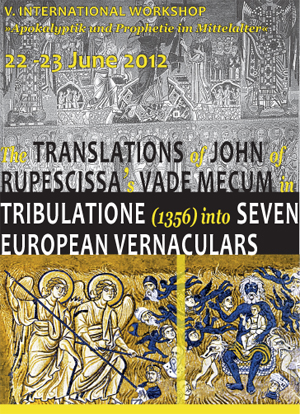 John of Rupescissa OFM was a highly influential late-medieval Latin author in terms of his role in Spiritual Franciscan propaganda, eschatological prophecy, and political discourse. Rupescissa’s incendiary Vade mecum in tribulatione, written in imprisonment in Avignon in 1356, was by far his most widely circulated work. As of today it is known to survive in some forty-one copies, aside from six others which have either been destroyed or are presently unlocatable. And that is only counting the Latin, for quite remarkably the work was translated into seven vernacular languages before roughly the year 1500. In alphabetical order these are, Castilian, Catalan, Czech, English, French, and German. Moreover, several of these languages were vehicles for more than one translation. For example, three independent French translations are known to exist. In some cases the vernacular versions do not encompass the entire work but are abbreviations or sets of selections: it is still too early to know the specifics. No more than two or three of the numerous texts here mentioned have been published. Accordingly, the numerous vernacular versions of the Vade mecum in tribulatione offer an extraordinarily rich data base for studying and comparing the choices and strategies, linguistic and ideological, that inhered in the translation of a Latin work, as well of course for studying comparative reception. It should be mentioned that while the data base is large, the original Latin work itself is of a manageable length—by a rough estimate it would come to about twenty octavo sized printed pages, divided into numbered units rather than extended prose. A critical edition of the Latin, obviously a prerequisite for studying the vernacular versions, will soon be completed and ready for use.
John of Rupescissa OFM was a highly influential late-medieval Latin author in terms of his role in Spiritual Franciscan propaganda, eschatological prophecy, and political discourse. Rupescissa’s incendiary Vade mecum in tribulatione, written in imprisonment in Avignon in 1356, was by far his most widely circulated work. As of today it is known to survive in some forty-one copies, aside from six others which have either been destroyed or are presently unlocatable. And that is only counting the Latin, for quite remarkably the work was translated into seven vernacular languages before roughly the year 1500. In alphabetical order these are, Castilian, Catalan, Czech, English, French, and German. Moreover, several of these languages were vehicles for more than one translation. For example, three independent French translations are known to exist. In some cases the vernacular versions do not encompass the entire work but are abbreviations or sets of selections: it is still too early to know the specifics. No more than two or three of the numerous texts here mentioned have been published. Accordingly, the numerous vernacular versions of the Vade mecum in tribulatione offer an extraordinarily rich data base for studying and comparing the choices and strategies, linguistic and ideological, that inhered in the translation of a Latin work, as well of course for studying comparative reception. It should be mentioned that while the data base is large, the original Latin work itself is of a manageable length—by a rough estimate it would come to about twenty octavo sized printed pages, divided into numbered units rather than extended prose. A critical edition of the Latin, obviously a prerequisite for studying the vernacular versions, will soon be completed and ready for use.
Evidently only an international consortium of linguistic experts and religious historians would be capable of doing the job of surveying the material outlined above. Thus a workshop comprised of scholars from many different countries is being scheduled for June 2012 to map out the work. The aim is a.) to take an inventory of all the transmissions, including multiple manuscripts (where the case arises) of any individual version, b.) to discuss methodical and theoretical possibilities of comparison of the transmitted versions, and c.) to probe the milieux of reception. The ultimate goal is a series of studies as well as the publication of editions of the various texts.
International Medieval Congress - Vernacularities in Post-National Perspective
11. 7. 2012
Leeds
Vernacularities in Post-National Perspective, I:
National Literatures and their Medieval Canons Reconsidered
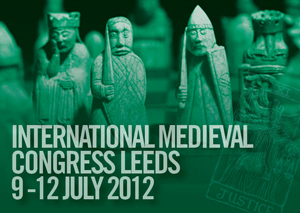 This session deals with the problem of the scholarly narrative of the medieval origins of vernacular literatures. The aim is to discuss critically traditional approaches of European philologies and literary sciences and look for new theoretical and methodological frames in which the medieval vernacular literatures could be investigated beyond the boundaries of nationally defined historiographical and philological narratives. The papers in this session describe some problems of selected national philologies and discuss their impact on the current state of the art.
This session deals with the problem of the scholarly narrative of the medieval origins of vernacular literatures. The aim is to discuss critically traditional approaches of European philologies and literary sciences and look for new theoretical and methodological frames in which the medieval vernacular literatures could be investigated beyond the boundaries of nationally defined historiographical and philological narratives. The papers in this session describe some problems of selected national philologies and discuss their impact on the current state of the art.
Vernacularities in Post-National Perspective, II:
Vernacular Translations, Thrills of Comparison
The session focusses on vernacular versions of the Vitas patrum, a very important collection of saints' lives which experienced broad reception in medieval Europe. Papers will demonstrate the rich history of translation of this collection in European vernaculars, compare research results in particular areas and critically discuss the potential of a comparative approach. The questions are: which research questions can a comparative method help to answer and which not? Can the comparative method be specified according to material or is it possible to develop some overarching comparative matrix? Is comparison without theory possible?
Vernacularities in Post-National Perspective, III:
The Worlds in and between Acculturation and Cultural Transfer
The session deals with the complex and flowering field of the theories of acculturation and cultural transfer. It seems that acculturation theory has gained its own dynamics, distancing itself from the evidence; theoretical models are not our tools anymore but our masters. How can we harmonise theory, methodology and material? How can we liberate the terms culture, acculturation, cultural transfer, centre, and periphery for pragmatic research; how can we 'medievalise' them?
1st International workshop - Historiographies of Identity
19. 10. 2012
IMAFO, Vienna
Narrating Community, Methodological Approaches
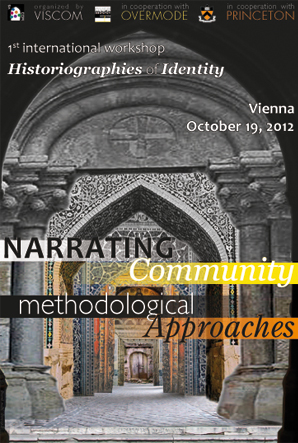 On March 1, 2011, the interdisciplinary SFB (Spezialforschungsbereich) “Visions of Community. Comparative Approaches to Ethnicity, Region and Empire in Christianity, Islam and Buddhism, 400 – 1600 CE (VISCOM)” has started its first four-year funding period in Vienna. In this project, medieval historians, social anthropologists and philologists will work together in an ambitious comparative research programme on the role of universal religions in the formation of particular communities in medieval Europe and Asia. It also seeks to promote theoretical and methodological reflection of the problems connected with such an intercultural comparison. The comparative approach should focus on the central issues of the project: Universal visions of community (promoting inclusive religious or political communities or social worlds) and particular identities (ethnic, territorial, religious, civic etc.). VISCOM departs from the assumption that texts do not simply reflect social groups, but also contribute to shaping them. One of the transversal goals of the project therefore is to study the social dimension of discourse and written communication.
On March 1, 2011, the interdisciplinary SFB (Spezialforschungsbereich) “Visions of Community. Comparative Approaches to Ethnicity, Region and Empire in Christianity, Islam and Buddhism, 400 – 1600 CE (VISCOM)” has started its first four-year funding period in Vienna. In this project, medieval historians, social anthropologists and philologists will work together in an ambitious comparative research programme on the role of universal religions in the formation of particular communities in medieval Europe and Asia. It also seeks to promote theoretical and methodological reflection of the problems connected with such an intercultural comparison. The comparative approach should focus on the central issues of the project: Universal visions of community (promoting inclusive religious or political communities or social worlds) and particular identities (ethnic, territorial, religious, civic etc.). VISCOM departs from the assumption that texts do not simply reflect social groups, but also contribute to shaping them. One of the transversal goals of the project therefore is to study the social dimension of discourse and written communication.
Consequently, studying the role of historiography in shaping and promoting certain forms of community and identity in the Middle Ages, as proposed in this joint project, is a central concern within VISCOM. This implies a number of specific research questions, for instance: Which social identities and ‘visions of community’ play a role in specific historiographic texts? Which of them are used as overarching frames of reference to structure the narrative? Which strategies of identification (legitimization, inclusion, distinction...) are employed with regard to different social groups? Does the text respond to other models of identification or frames of reference? On which traditions (holy scripture, historiographic models, myths and legends) does the text rely, how does it modify them? How is the text changed and rearranged in the course of its transmission? What does the choice of language imply, and what impact did interlingual translations and specific literacies have? Of course, these are just a few exemplary questions, and which ones are relevant also depends from the context of the single volumes and from the specific topic.
Third Expert Meeting
17.-18. 1. 2013
Vienna
Religious Acculturation III
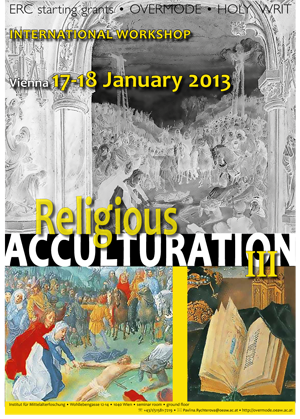 The workshop aims at theoretical and methodological questions and problems concerning the processes of religious acculturation and formation of religious identities in late medieval and early modern Europe. Discussed will be: a) the “search for identity” in medieval religious texts – how various identities meet and merge in them, how they influence each other, how they change and produce new qualities; b) vernacular texts, mainly translations whose main intention was to provoke a public response, either in politics or in theology or (usually) for combined uses; c) group dynamics and relations between individuals and formal and informal groups in the reconstruction of processes of cultural and religious transformation and religious acculturation; d) didactic literature, with a specific stress on Mirror of Princes - strategies of transmission of moral and religious contents and the relation between worldly, moral and religious leadership in the changing political, social and religious patterns of the very long fifteenth century; e) the interconnections between medieval images, texts, theater, and practices of viewing, reading and listening, exploring various manifestations of performance and meanings of performativity in late medieval religious life; f) forms, patterns, strategies and outcomes of the collaboration and exchange between religious individuals, clerical groups and institutions and lay individuals, groups and associations and g) theoretical background and methodological approach in research on Latin as well as vernacular religious texts, their contextualisation and the possibilities of comparison.
The workshop aims at theoretical and methodological questions and problems concerning the processes of religious acculturation and formation of religious identities in late medieval and early modern Europe. Discussed will be: a) the “search for identity” in medieval religious texts – how various identities meet and merge in them, how they influence each other, how they change and produce new qualities; b) vernacular texts, mainly translations whose main intention was to provoke a public response, either in politics or in theology or (usually) for combined uses; c) group dynamics and relations between individuals and formal and informal groups in the reconstruction of processes of cultural and religious transformation and religious acculturation; d) didactic literature, with a specific stress on Mirror of Princes - strategies of transmission of moral and religious contents and the relation between worldly, moral and religious leadership in the changing political, social and religious patterns of the very long fifteenth century; e) the interconnections between medieval images, texts, theater, and practices of viewing, reading and listening, exploring various manifestations of performance and meanings of performativity in late medieval religious life; f) forms, patterns, strategies and outcomes of the collaboration and exchange between religious individuals, clerical groups and institutions and lay individuals, groups and associations and g) theoretical background and methodological approach in research on Latin as well as vernacular religious texts, their contextualisation and the possibilities of comparison.
Internationales Symposion
5.-8. 2. 2013
Wien
Origin Stories. The Rise of Vernacular Literacy in a Comparative Perspective
Vom 5. bis zum 16. Jahrhundert etablieren sich in allen europäischen Regionen die heute sogenannten ‚Volkssprachen‘. Der Prozess des Eintritts der linguae vernaculae vel barbaricae in die Sphäre von Schriftlichkeit und Gelehrsamkeit, die im jüdisch-christlichen Bereich der Trias der ‚heiligen’ Sprachen (Hebräisch, Griechisch, Latein) und zum Teil auch dem Altkirchenslawischen vorbehalten war und bleiben wird, kann je nach sozialen Kontexten, kulturellen Rahmenbedingungen und Einflussfaktoren in völlig unterschiedlicher Weise dargestellt werden. Die Tagung will die Frage nach den Anfängen volkssprachiger Schriftlichkeit im Mittelalter aufgreifen und dabei eine komparatistische Perspektive einnehmen. Diese soll möglichst die Gesamtheit jener Volkssprachen in den Blick bekommen, die im Mittelalter vom Nordwesten bis zum Südosten Europas den Sprung in jene Schriftlichkeit taten, die bis dahin den gelehrten bzw. liturgischen Idiomen vorbehalten war. Angestrebt wird im Blick auf das Ganze eine konsequente Vernetzung von überlieferungsgeschichtlichen Befunden und ihrer (historischen und literaturwissenschaftlichen) Auswertung, was bislang in dieser Form von der Forschung nicht geleistet wurde und womit auch der Blick für die wissenschaftshistorischen Prämissen der ‚Nationalphilologien‘ geschärft werden soll.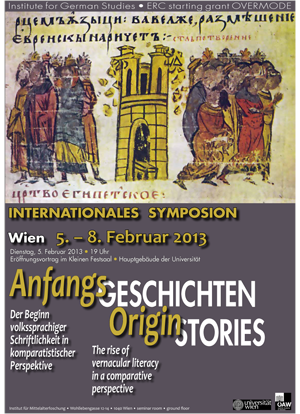 Das Ziel der Tagung ist, eine möglichst breite Diskussion über die Geschichte der Anfänge volkssprachiger Schriftlichkeit im europäischen Kontext anzuregen. Es wird daher von der Perspektive der jeweiligen Überlieferungsgeschichte ausgegangen, deren Bedeutung in den philologischen und historischen Fachdisziplinen gegenwärtig ein hoher Wert beigemessen wird, wenn auch je nach Fach unterschiedlich stark akzentuiert. Die Überlieferung soll nach möglichen Mustern und Regeln, nach Praktiken und Inhalten von Verschriftung und Verschriftlichung befragt werden. Darin sehen wir die Chance, gemeinsam an einer zentralen kulturwissenschaftlichen Fragestellung im Schnittpunkt von Geschichtswissenschaft, Mediengeschichte und Literaturwissenschaft zu arbeiten.
Das Ziel der Tagung ist, eine möglichst breite Diskussion über die Geschichte der Anfänge volkssprachiger Schriftlichkeit im europäischen Kontext anzuregen. Es wird daher von der Perspektive der jeweiligen Überlieferungsgeschichte ausgegangen, deren Bedeutung in den philologischen und historischen Fachdisziplinen gegenwärtig ein hoher Wert beigemessen wird, wenn auch je nach Fach unterschiedlich stark akzentuiert. Die Überlieferung soll nach möglichen Mustern und Regeln, nach Praktiken und Inhalten von Verschriftung und Verschriftlichung befragt werden. Darin sehen wir die Chance, gemeinsam an einer zentralen kulturwissenschaftlichen Fragestellung im Schnittpunkt von Geschichtswissenschaft, Mediengeschichte und Literaturwissenschaft zu arbeiten.
Befragt werden sollen in dem Zusammenhang ebenfalls nationalwissenschaftliche Prämissen der einzelnen Fachtraditionen: Inwiefern rechtfertigt ein konkreter Befund der Frühestüberlieferung bereits eine Ausdifferenzierung zwischen verwandten Philologien, wie etwa Germanistik und Anglistik, oder Romanistik und Latinistik? Inwieweit (er-)fanden und (er-)finden sich die einzelnen institutionalisierten Disziplinen in den Zeugnissen ihrer Frühzeit selbst?
Dieser Ansatz setzt einen gemeinsamen methodischen Rahmen voraus. Das gängige Narrativ der jeweiligen ‚Anfangsgeschichten der Überlieferung’ von Volkssprachen soll als Gegenstand einer fachlichen und methodischen Reflexion im Hintergrund stehen. Die einzelnen Analysen sollen sich an primären Daten orientieren, verstanden als eine repräsentative Bestandsaufnahme der verschriftlichten Anfänge der jeweiligen Volkssprache, d.h. eine Übersichtsliste zu den jeweils frühesten Handschriften jenseits der Einzelwortüberlieferung. Was dabei für jede Einzelsprache als ‚repräsentativ’ für ihre jeweilige Anfangsgeschichte gilt und welcher Beschreibungszeitraum zugrunde gelegt wird, soll hier ganz bewusst nicht weiter spezifiziert oder gar vorgegeben werden (als Beispiel für eine auf Vollständigkeit zielende Bestandsaufnahme kann das ‚Paderborner Repertorium der deutschsprachigen Textüberlieferung des 8. bis 12. Jahrhunderts’ genannt werden).
Die einzelnen Bestandsaufnahmen der frühesten schriftlichen Überlieferung liefern die notwendige Grundlage für medien- und literarhistorische Analysen des Materials, die das eigentliche hermeneutische Potential des Ansatzes sichtbar machen sollen. Durch die strikt überlieferungsgeschichtliche Perspektive eröffnet sich die Chance, neue chronologische, räumliche und sachliche Zusammenhänge, neue Kontinuitäten aber auch Diskontinuitäten – sprachintern wie sprachübergreifend – in den Blick treten und beschreibbar werden zu lassen, die bisher geläufigen Zugangsweisen von Literaturgeschichte und Literaturgeschichtsschreibung verstellt bleiben mussten. Dazu gehört gewiss auch eine – bislang nicht im Ansatz unternommene – Beschreibung von Berührungspunkten der ‚Anfangsgeschichten’ untereinander, wie ein übergreifender komparatistischer Blick auf die Relation von Volkssprachen zu den liturgischen bzw. gelehrten Sprachen (s.o.).
Die Tagung hält sich in der Auswahl der Sprachen bzw. Literaturen nicht strikt an Einzelsprachen oder übergreifende Sprachfamilien, sondern wählt einen Zwischenweg, der nicht zuletzt der wissenschaftshistorisch bedingten Beschreibungspraxis im modernen universitären Zusammenhang geschuldet ist. In Frage kommen folgende Sprachen bzw. Sprachgruppen: Die westgermanischen Sprachen (Deutsch, Niederländisch, Friesisch, Englisch), Gotisch, Skandinavisch (mit Isländisch, Schwedisch, Norwegisch Dänisch), Französisch, Italienisch, Iberoromanisch (Spanisch, Portugiesisch, Katalanisch), Irisch (Gälisch), Keltisch, Finno-ugrisch, Georgisch, Armenisch, Baskisch und die Sprachen der slawischen Gruppe der Indogermania. Dazu sollen exemplarisch Vergleiche zu derselben Fragestellung in anderen Sprach- und Kulturkreisen angestellt werden, etwa zum Sanskrit, Chinesisch, Persisch oder Türkisch.
Das konkrete, übergeordnete Erkenntnisinteresse, das wir mit diesem Ansatz verfolgen, wollen wir in drei Problemfelder unterordnen, die im Hintergrund jeder ‚Anfangsgeschichte’ stehen. Sie werden in Form systematischer methodisch-theoretischer Querschnitte als einführende Beiträge (Key-Note-Lectures) neben den geplanten überlieferungsgeschichtlichen Einzelfallstudien thematisiert. Ziel ist dabei eine gewisse Harmonisierung von Forschungspositionen, die sich in der aktuellen Wissenschaftslandschaft auf unterschiedlichen Ebenen begegnen, wobei sie gleichzeitig in ganz elementarer Weise aufeinander angewiesen sind. Der Blick auf die Anfänge von Überlieferung im europäischen Kontext soll mithin zu einer ersten, gewiss tentativen Antwort auf die Frage führen, ob und wie weit spezifische oder auch gemeinsame Regeln und Mechanismen in der Formierung verschiedener Überlieferungskulturen herauszufinden sind.
VI. Workshop „Apokalyptik und Prophetie im Mittelalter“
26-28 June 2013
The Translations of John of Rupescissa’s Vade mecum in tribulatione (1356)
into Seven European Vernaculars II
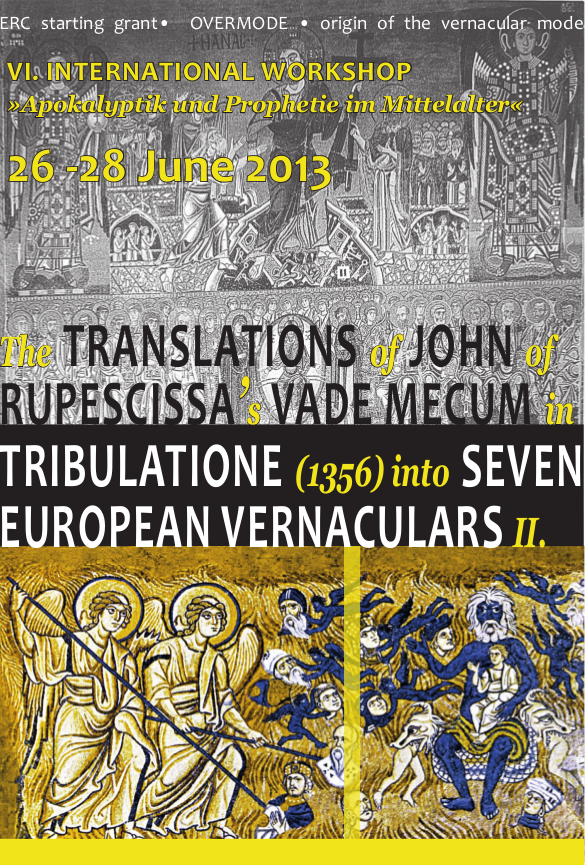 In June 2013 took place the second meeting concerning the medieval translation of Vademecum in tribulation into seven vernacular languages. The participants presented results of their research and continued in the discussions which are vivid already almost three years. At the moment we have transcriptions of the vernacular texts (in some cases complete editions indeed) and can follow the way of looking for the story of transmission of the text in vernaculars and the mutual textual influences. In Prague we have noted close relations between German, one of Czech and French translation. The same we can say about French and Italian translation as well. The team has to continue on working on the texts in next month in order to prepare all critical editions, to find all the textual relations and publish the book about it all.
In June 2013 took place the second meeting concerning the medieval translation of Vademecum in tribulation into seven vernacular languages. The participants presented results of their research and continued in the discussions which are vivid already almost three years. At the moment we have transcriptions of the vernacular texts (in some cases complete editions indeed) and can follow the way of looking for the story of transmission of the text in vernaculars and the mutual textual influences. In Prague we have noted close relations between German, one of Czech and French translation. The same we can say about French and Italian translation as well. The team has to continue on working on the texts in next month in order to prepare all critical editions, to find all the textual relations and publish the book about it all.
International Medieval Congress
1-4 July 2013
Leeds
Ideology of Translation, I: The Office of the Translators
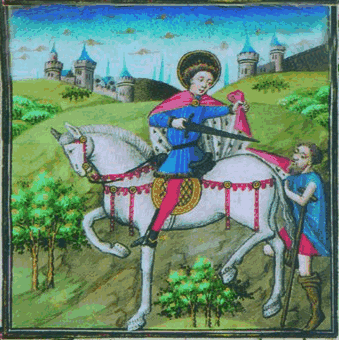 Regarding the officially translated correspondence of the (Western as well as Byzantine) (imperial) courts the session focusses on these translators and their work from a sociolinguistic point of view: On the one hand the officeholder are exemplarily analysed by their ability as well as accuracy of handling the language of the addressee (abroad), i.e. how important the chancellery regarded an adequate rendering of its correspondence and which mode of translating had more weight: ad litteram or ad sensum. This topic raises the question whether the basic text itself to an addressee abroad is formulated in a higher (rhetorical) stylistic level, therefore for a non-native speaker a priori difficult, if not incomprehensible (at least in a literary translation), or if the addresser wants to make advances to the addressee by using a lower style, respecting also the difficulty of his translator to handle the text in an adequate way. In this sense the discourse element of the correspondence is analysed from its direct contact between addresser and addressee via the translation. On the other hand, the sociolinguistic aspects is presented with regard to the distinction of the basic (original) text (the text studied for historical analyses of relationship) and the translated or even interpreted text which the addressee really (understands and) reads and normally is the textual basis a correspondent is referring to (with all the accompanying problems e.g. In theological discussions of translated bible or patristic passages).
Regarding the officially translated correspondence of the (Western as well as Byzantine) (imperial) courts the session focusses on these translators and their work from a sociolinguistic point of view: On the one hand the officeholder are exemplarily analysed by their ability as well as accuracy of handling the language of the addressee (abroad), i.e. how important the chancellery regarded an adequate rendering of its correspondence and which mode of translating had more weight: ad litteram or ad sensum. This topic raises the question whether the basic text itself to an addressee abroad is formulated in a higher (rhetorical) stylistic level, therefore for a non-native speaker a priori difficult, if not incomprehensible (at least in a literary translation), or if the addresser wants to make advances to the addressee by using a lower style, respecting also the difficulty of his translator to handle the text in an adequate way. In this sense the discourse element of the correspondence is analysed from its direct contact between addresser and addressee via the translation. On the other hand, the sociolinguistic aspects is presented with regard to the distinction of the basic (original) text (the text studied for historical analyses of relationship) and the translated or even interpreted text which the addressee really (understands and) reads and normally is the textual basis a correspondent is referring to (with all the accompanying problems e.g. In theological discussions of translated bible or patristic passages).
Ideology of Translation, II: Politics of Translation
This session will be devoted to translations whose main intention is to provoke a public response, either in politics or in theology or in both. It is a social phenomenon that ever since a writing and reading culture exists persons outside of a particular social group try to influence it by approaching it in their communication way. Here, this aspect is analysed from the point of view of translated texts made by a cultural as well as political (and/or theological) well defined society which should intrude into the others' society to convince, persuade or win its members for a particular position. Thus, translations are studied as a medium of intercultural or intersocial contact and influence. On this occasion the question arises which means were used to succeed and why a text failed success. The session will emphasize the causes and motives of influencing within the society(ies) by translations and how these translations could reach its audience and therefrom take influence on a particular society. Significant for this category are translations of theological texts to convince a society of the unadulterated faith, as mirrored in translations in times of union debates as well as of theological controversies. Through the translation and the intention of reaching a broader audience these texts attain a significant sociolinguistic dimension.
Ideology of Translation, III: Translation and the Cultural Dynamics
Medieval literature presents a great deal of translations which cannot be exclusively assigned to politically or theologically motivated translations. Regarding these aspects from a sociolinguistic point of view the question arises which topics are so uniform that another culture can adopt it in its language or where has a translator to change it to his culture, a phenomenon which may be defined as (unconscious) cultural censorship. If a translated text is accepted, the sociolinguistic research can trace the social factors of its influence and audience. The topic itself is not convincing enough that a text was translated with a special interest and that this translation is accepted in the surroundings of a new society; the society must also be 'disposed' to accept this text (if successful). There are texts which only a very small audience group were interested in (and thus made or arranged a translation), socially they had no further influence. On the other side some translations (as the works of Aristotle) broadened the horizon of a society and were warmly welcome, texts which in former times had no or not this great success of influence. In this sense translations mirror also the social development and attention to special topics and its 'need' of texts from other cultures/societies. The acceptance or refusal of such translated texts reflects in consequence a closer or more remote feeling towards the other society.
Akademiekonferenz junger Wissenschaftler aus Deutschland und Tschechien
30. 9.-2. 10. 2013
Heidelberg
Heilige, Helden, Wüteriche. Verflochtene Herrschaftsstile im langen Jahrhundert der Luxemburger
Organisatoren: Martin Bauch, Julia Dücker, Tomáš Gaudek, Paul Töbelmann, Vaclav Žůrek
Zwischen 1308 und 1437 herrschten vier Angehörige der luxemburgischen Dynastie über das Heilige Römische Reich sowie weite Teile Europas. Hinsichtlich der kulturell-politischen Sozialisierung wie auch in Bezug auf konkrete Erscheinungsformen von Herrschaft und Königtum wurde die Zeit zwischen Heinrich VII. (1308-1311) und Sigismund (1411-1437) von fundamental unterschiedlichen Herrscherpersönlichkeiten geprägt. Weniger als geradlinige Entwicklungen scheinen dabei Diskontinuitäten und Brüche die Regierung der Könige und Kaiser zu charakterisieren – ein Eindruck, den auch die Zeitgenossen teilten: Sie rezipierten und kommentierten die unterschiedlichen Herrschaftsstile, die die Luxemburger als Helden, Heilige oder gar Wüteriche erscheinen ließen.
Die geplante Konferenz zur interdisziplinären Mittelalterforschung stellt deshalb die Frage, ob es ein ‚langes Jahrhundert der Luxemburger‘ von 1308 bis 1437 gab. Unter dem Leitbegriff des ‚Herrschaftsstils‘ wollen junge Historiker/-innen und Kunsthistoriker/-innen aus Tschechien und Deutschland die Möglichkeiten ausloten, über alle offenbaren Brüche dynastischer oder politischer Art hinweg die europaweite Vorbildfunktion und Tiefenwirkung monarchischer Herrschaftsstile zu analysieren. Mit diesem Ansatz schließt die Konferenz an zwei in den Fächern Geschichte und Kunstgeschichte etablierte Forschungsperspektiven an: Während von Historikern viel zu einzelnen Herrschern gearbeitet wurde, kamen Überlegungen zur Zeit der Luxemburger als Einheit oder gar als Epoche kaum zum Tragen. Gerade aufgrund nationaler und ideologischer Vorprägungen wurden derartige Kontinuitäten oder gar wechselseitige Beeinflussungen von Herrschaftsstilen zumeist nicht in Betracht gezogen. In der Kunstgeschichte dagegen wurde die Zeit der Luxemburger als im überregionalen Austausch stehende Blütezeit der mitteleuropäischen Kunst durchaus als distinkte Epoche gewürdigt. Ihre Artefakte stellte die kunsthistorische Forschung oft sehr rasch in einen konkreten historisch-politischen Kontext. Eine Modifikation der Perspektiven durch die Ergebnisse des jeweils anderen Fachs erfolgte jedoch bisher noch zu selten. Mit der Begegnung junger Wissenschaftler aus Tschechien und Deutschland im Rahmen einer paritätisch besetzten Tagung hoffen die Antragsteller neue, lohnende Wege zu betreten.
Im Rahmen einer zweitägigen interdisziplinären Konferenz soll deshalb diskutiert werden, inwieweit sich die jeweiligen Ausformungen eines konkreten Herrschaftsstils – seien es sakrale Elemente oder ritualisierte politische Handlungen, ostentative Emotionen, genealogische Mythen, Kunstwerke oder literarische Produktionen mit politischer Funktion – auf luxemburgische Prägung oder Vermittlung zurückführen lassen. Die Konferenz gibt vor allem jungen Wissenschaftlern (Doktoranden und Postdoktoranden) aus den Disziplinen Geschichtswissenschaft und Kunstgeschichte die Möglichkeit, ihre eigenen Forschungsergebnisse zu präsentieren.
Mittels dieses interdisziplinären Austauschs junger Wissenschaftler aus Europa können so nicht nur individuelle Herrschaftsstile untersucht werden, vielmehr soll das postulierte ‚lange Jahrhundert der Luxemburger‘ mit seinen Bruchstellen, Verflechtungen und Kontinuitäten in europäischer Perspektive erstmals angemessen erschlossen werden.
International Workshop
14.-16. 11. 2013
Prague
The Library and Literary Activities of the Augustinians of Roudnice (Raudnitz), 1333-1500
The Augustinian canonry in Roudnice (founded in 1333 by the Prague bishop John IV of Dražice) is generally considered to have served as a power base of the archbishops of Prague and thus to have been crucial for the formation and development of intellectual life in late medieval Bohemia. At the same time, neither the holdings of the library nor the writings of the canons of Roudnice have been thoroughly researched yet.
The workshop aims at gathering scholars dealing with this particular topic and thus to begin to survey and analyse the manuscripts and texts written by the Augustinians in Roudnice, acquired by them, as well as those written by them during their exile (the canonry was destroyed in 1421 by the Hussites). Through establishing connections between the texts transmitted in particular codices, their models, as well as their vernacular translations, the workshop attempts to contribute to the understanding of the exact role of this particular intellectual centre in the process of vernacularisation of elite Latin discourses, as well as its role in shaping the cultural and intellectual environment of late medieval Bohemia in general.
In addition, scholars focusing on intellectual culture in other Augustinian houses of the time (the second half of the 14th and the first half of the 15th century), or within other orders that might have influenced or be influenced by Roudnice, are most welcome to take part. Their contributions will provide a comparative perspective to this specific case study.
6st International workshop - Historiographies of Identity
15.-17.4.2014
CMS, Prague
Historiographies of Identity – Social Functions of Historical Writing from Classical Antiquity to the Middle Ages VI
Narrating Communities between Latin and Vernaculars: Historiographies in Central and Eastern Central Europe (13th – 16th ct.)
- Organisatoren:
- OVERMODE, VISCOM
The workshop will discuss Central European and Eastern Central European historiographies of the High and Late Middle Ages. It will thus deal with histories written in a time which brought about a profound differentiation of medieval societies in these regions – among others, a differentiation of the nobility, the rise of urban societies, the formation of new social strata and distinct groups (for example universities), and an increasing mobility and permeability of social elites. These and many others changes presented a serious challenge both to individuals and social groups. Consequently, the demand for reassuring identifications grew the more pressing the more social strata achieved their share of economic and political power. Narrative offers of identification produced and reproduced by historiography perhaps did not necessarily grow more complex than in the previous periods, but surely more differentiated – often tailored specifically for distinct social groups, in competition with other groups and their narratives, and often using the language of a particular target group: the vernaculars instead of the universal language of elite education, Latin.
The workshop aims at exploring whether and in which way new social demands and new languages influenced historiographical narratives, their forms and contents, their impact and their reception. It addresses the question which strategies of identification individual works developed to balance many alternative modes of identification. What happened to historiographical narratives dominant in the European Early Middle Ages in times characterized by a substantial increase and diversification of source material and narrative forms and styles? Which narratives were appropriated and adapted in new societal contexts, thus developing into new models for constructions of communities and remaining politically successful? Which of them in turn lost their direct impact and thus became “petrified” elements of specific, e.g. learned, discourses? Which new narratives were developed? What role did historiography have in shaping communication between particular social groups and in the formation of new narrative communities on – and beyond – local and regional levels?
Of an eminent interest is the interplay between the languages – in the area under scrutiny that was, apart from Latin, mainly German and Czech, but also Polish and Hungarian. In this interplay orality and literacy interacted, with mutual effects on each other. Late medieval source material suggests complex relations not only between Latin and vernaculars, but also between oral and written language. Both were used in heterogeneous ways in Latin and in the vernaculars, in learned and popular discourses. Which consequence do these interrelations have for our assessment of how historical actors thought about history, and why and how they made use of writing history to make sense of their worlds and the social relations within it?
The First Decades of Prague University
6.-7.11.2014
Jilská 1, Prague
The First Decades of Prague University
Transforming Intellectual space in 14th c. Central Europe
- Sponsored by:
- OVERMODE (ERC, No. 263672) and Grant Agency of the Charles University in Prague (No. 1124413)
- Organised by:
- Institute for Medieval Research of the Austrian Academy of Sciences (IMAFO ÖAW) and Centre for Medieval Studies of the Czech Academy of Sciences (CMS AV ČR); Jan Odstrčilík (IMAFO ÖAW), Francesca Battista (Charles University in Prague) and Riccardo Burgazzi (Charles University in Prague)
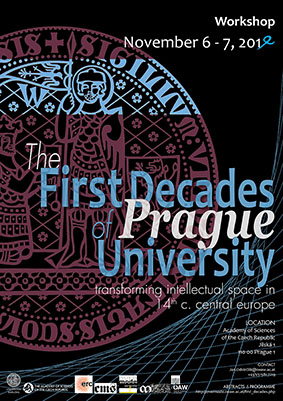 The main research attention about the history of the Prague University was usually given to the disturbing time of the first decades of the 15th century with the pre-national conflicts and rise of the pre-reformation Hussite movement. We would like shift the focus on the first 50 years of the Prague University and answer at least some of these questions: How did establishing the Prague University change the cultural and intellectual space in Central Europe? What were the influences from other, already established universities? How peculiar or common were the works of Prague masters and students? How do the new findings reshape our understanding of the university’s role during the first decades of its existence? These aspect will be covered by six sessions in two days. Please, check the programme and the abstracts.
The main research attention about the history of the Prague University was usually given to the disturbing time of the first decades of the 15th century with the pre-national conflicts and rise of the pre-reformation Hussite movement. We would like shift the focus on the first 50 years of the Prague University and answer at least some of these questions: How did establishing the Prague University change the cultural and intellectual space in Central Europe? What were the influences from other, already established universities? How peculiar or common were the works of Prague masters and students? How do the new findings reshape our understanding of the university’s role during the first decades of its existence? These aspect will be covered by six sessions in two days. Please, check the programme and the abstracts.
4/2015
Hollandstrasse 11-13, Vienna
III. Workshop ‘Translations of John of Rupescissa’s Vade mecum in tribulatione (1356) into Seven European Vernaculars’
ÖAW Wien, zusammen mit Robert Lerner, Univ. Chicago, Gian Luca Potesta, Univ. Milano)
20.-22.5.2015
Hull
COST Action IS 1301 Workshop working group I (Univ. of Hull, together with Elisabeth Salter, Univ. of Hull)
International Medieval Congress - Reform and Renewal
6.-9.7.2015
Leeds
Sessions 522, 622, 722, 822:
‘Wycliffe, Hus, and the Impact of Reform I-IV’
- Organized by:
- Pavlína Rychterová, Pavel Soukup, Petra Mutlová
- Description:
- Jan Hus at IMC in Leeds 2015
I: The Puzzle of Transmission
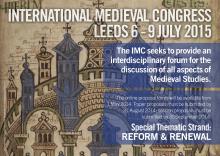 The Wycliffite and Hussite projects of Church reform represent the most thorough attempts in late-medieval Europe to reshape religious and political ideologies and practices. In both cases, an academic controversy was immediately followed by a long-lasting ecclesiastical-political conflict. Despite the achievements of research into the Bohemian reception of Wycliffe’s writings, new comparative approaches need to be adopted in order to better understand the preconditions, realities and developments in England and Bohemia, as well as the Hussites’ bold experiment aimed at implementing some of the most radical Wycliffite ideas. The set of four sessions brings together specialists from Wycliffite and Hussite studies who will discuss their research into these late-medieval religious and political reform programs. In this session, the modalities of reception of the key writings of Wycliffe and Hus will be discussed, focusing on their manuscript transmission and cultural contexts.
The Wycliffite and Hussite projects of Church reform represent the most thorough attempts in late-medieval Europe to reshape religious and political ideologies and practices. In both cases, an academic controversy was immediately followed by a long-lasting ecclesiastical-political conflict. Despite the achievements of research into the Bohemian reception of Wycliffe’s writings, new comparative approaches need to be adopted in order to better understand the preconditions, realities and developments in England and Bohemia, as well as the Hussites’ bold experiment aimed at implementing some of the most radical Wycliffite ideas. The set of four sessions brings together specialists from Wycliffite and Hussite studies who will discuss their research into these late-medieval religious and political reform programs. In this session, the modalities of reception of the key writings of Wycliffe and Hus will be discussed, focusing on their manuscript transmission and cultural contexts.
Details
II: The Pitfalls of Learned Debate
The Wycliffite and Hussite projects of Church reform represent the most thorough attempts in late-medieval Europe to reshape religious and political ideologies and practices. In both cases, an academic controversy was immediately followed by a long-lasting ecclesiastical-political conflict. Despite the achievements of research into the Bohemian reception of Wycliffe’s writings, new comparative approaches need to be adopted in order to better understand the preconditions, realities and developments in England and Bohemia, as well as the Hussites’ bold experiment aimed at implementing some of the most radical Wycliffite ideas. The set of four sessions brings together specialists from Wycliffite and Hussite studies who will discuss their research into these late-medieval religious and political reform programs. In this session, focus will be on the intellectual settings in which Wycliffite and Hussite ideas took shape, especially at the universities of Oxford and Prague and the Council of Constance.
Details
III: The Struggle for Simple Minds?
The Wycliffite and Hussite projects of Church reform represent the most thorough attempts in late-medieval Europe to reshape religious and political ideologies and practices. In both cases, an academic controversy was immediately followed by a long-lasting ecclesiastical-political conflict. Despite the achievements of research into the Bohemian reception of Wycliffe’s writings, new comparative approaches need to be adopted in order to better understand the preconditions, realities and developments in England and Bohemia, as well as the Hussites’ bold experiment aimed at implementing some of the most radical Wycliffite ideas. The set of four sessions brings together specialists from Wycliffite and Hussite studies who will discuss their research into these late-medieval religious and political reform programs. In this session, the focus will be on the social impact of reform ideas, the strategies of the chief ideologists to get broader support, and the various responses to reform agendas.
Details
IV: Battle of Words - Battle of Swords
The Wycliffite and Hussite projects of Church reform represent the most thorough attempts in late-medieval Europe to reshape religious and political ideologies and practices. In both cases, an academic controversy was immediately followed by a long-lasting ecclesiastical-political conflict. Despite the achievements of research into the Bohemian reception of Wycliffe’s writings, new comparative approaches need to be adopted in order to better understand the preconditions, realities and developments in England and Bohemia, as well as the Hussites’ bold experiment aimed at implementing some of the most radical Wycliffite ideas. The set of four sessions brings together specialists from Wycliffite and Hussite studies who will discuss their research into these late-medieval religious and political reform programs. In this session, the focus will be on the reaction of power centers to reform ideas and on the formation of Wycliffite and Hussite movements.
Details
International Medieval Congress - Food, Feast & Famine
4.-7.7.2016
Leeds
Session 1332:
‘Dangerous Books: Readers' Responses to Heretical Literature, Apocryphal Sources, and Other Suspicious Texts’, 500-1500
- Organized by:
- Pavlína Rychterová and Irene Van Renswoude
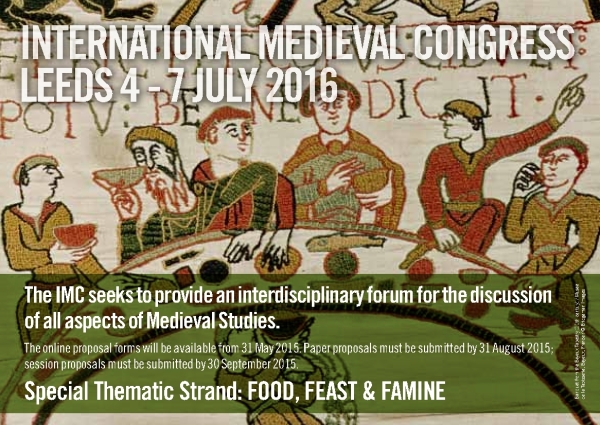 Catalogues and lists that prescribed which books were good to read and which ones should be rejected circulated long before the Index of Forbidden Books (1559). To what extent were the warnings and prohibitions of such lists followed in practice? Were heretical and suspicious books actually banned from being read? Or was there room to discuss the (fluid?) line between acceptable and unacceptable reading? This panel examines the responses of readers and authors to ‘dangerous books’ from the early to the late Middle Ages. Paper a takes a closer look at the prohibitions in medieval book lists and studies the annotations of readers in the margins of rejected texts. Paper b demonstrates the fluidity in categories of acceptability; it shows how Hrosvit of Gandersheim (fl.960) was attracted to apocryphal sources and re-introduced texts that ought to have been suppressed. Paper c discusses the argumentative strategies of Jan Hus’s polemical tract ‘Why the books of the heretics should be read’ (1410) written against the decree to burn John Wyclif’s books.
Catalogues and lists that prescribed which books were good to read and which ones should be rejected circulated long before the Index of Forbidden Books (1559). To what extent were the warnings and prohibitions of such lists followed in practice? Were heretical and suspicious books actually banned from being read? Or was there room to discuss the (fluid?) line between acceptable and unacceptable reading? This panel examines the responses of readers and authors to ‘dangerous books’ from the early to the late Middle Ages. Paper a takes a closer look at the prohibitions in medieval book lists and studies the annotations of readers in the margins of rejected texts. Paper b demonstrates the fluidity in categories of acceptability; it shows how Hrosvit of Gandersheim (fl.960) was attracted to apocryphal sources and re-introduced texts that ought to have been suppressed. Paper c discusses the argumentative strategies of Jan Hus’s polemical tract ‘Why the books of the heretics should be read’ (1410) written against the decree to burn John Wyclif’s books.
Details
15.-18.3.2017
Hollandstrasse 11-13, Vienna
The XI Cardiff Conference on the Theory and Practice of Translation in the Middle Ages
The Medieval Translator: Medieval Translations & and Their Readership
- Organisers:
- Editorial Board of The Medieval Translator series (Brepols)
- ERC Grant Origins of the Vernacular Mode; COST Action 1301: New Communities of Interpretation
- Institute for Medieval Research - Austrian Academy of Sciences/ÖAW
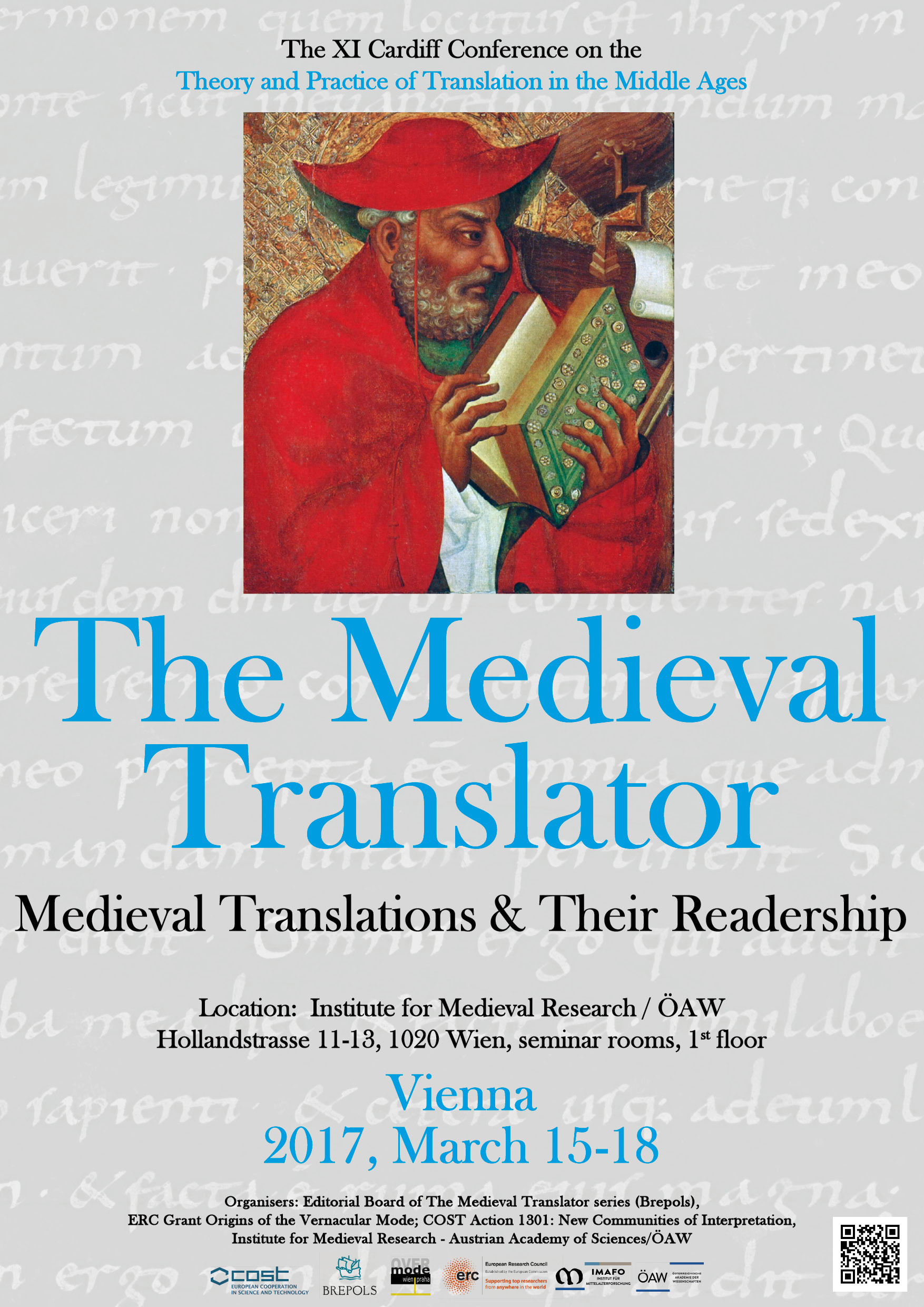
The series of Cardiff Conferences seeks to provide an interdisciplinary forum for the discussion of all aspects of the translation in the Middle Ages.
Special Thematic Strand:
Medieval Translations and Their Readership
Papers are dealing with the reader as the socio-cultural node of each translation activity. The focus is on the role of the reader in the process of translation, on the communities of readers and on their active participation in translators' choices, as well as on the relationship of texts and their recipients in general and on the translation as a result of a dialogue between text and reader.
See the programme and other details15.-17.5.2018
Hollandstrasse 11-13, Vienna
Understanding Multilingual Sermons of the Middle Ages
Forms, Methodologies, and Challenges
- Organisers:
- Jan Odstrcilik
- Institute for Medieval Research, Austrian Academy of Sciences/ÖAW
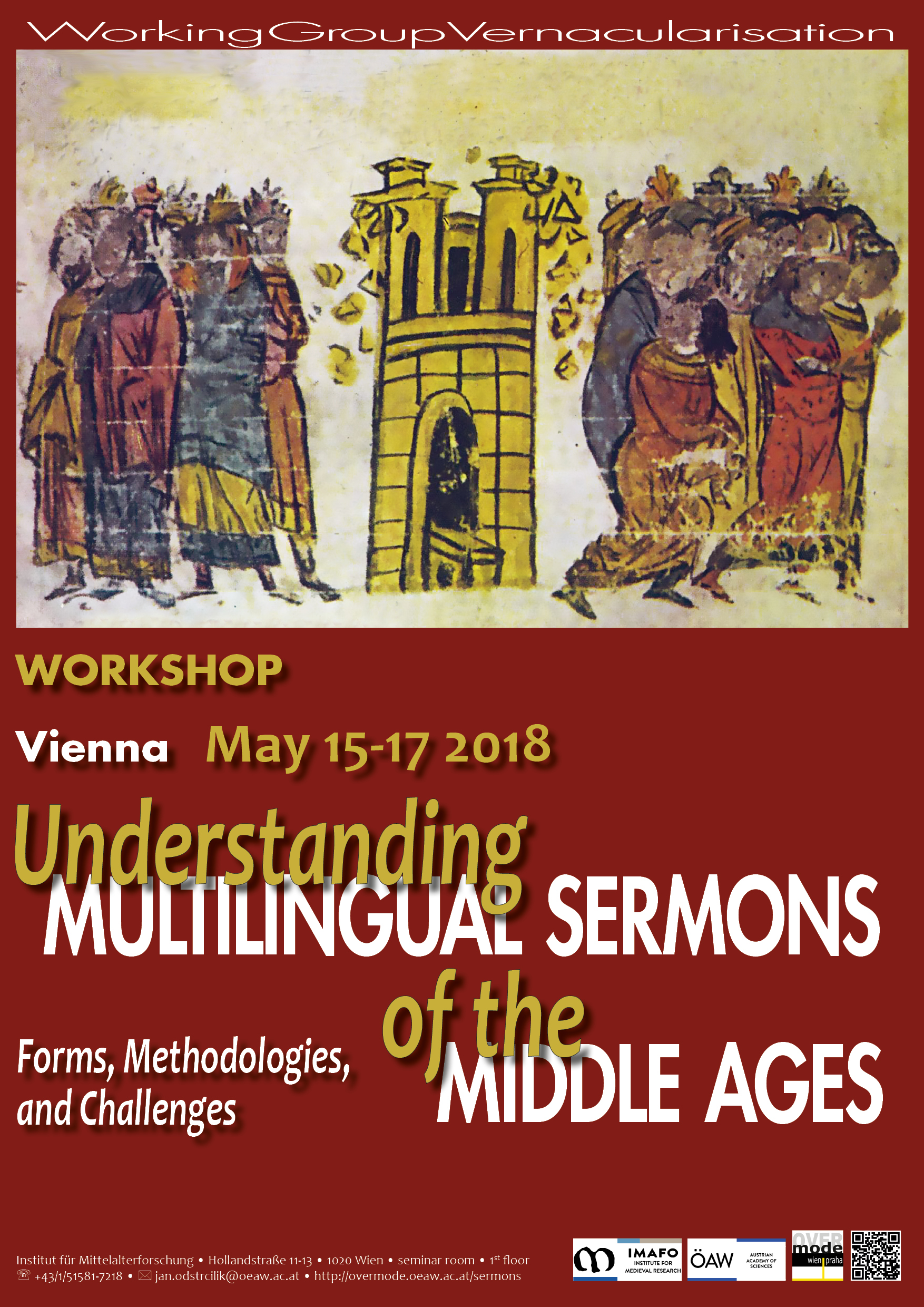
Multilingual sermons are common in almost every part of Europe, although many of them are still waiting for the appropriate research attention. Related methodologies are still unsettled, as well as opinions regarding their origin, purpose, and relation to possible performance. However, be they reportationes, artificial creations of preachers, or translations, be they written for preachers, or readers, they all represent the complex language situation of the European High and Late Middle Ages. The workshop seeks to connect researchers working on this topic from various perspectives and on various material.
See the programme and other details